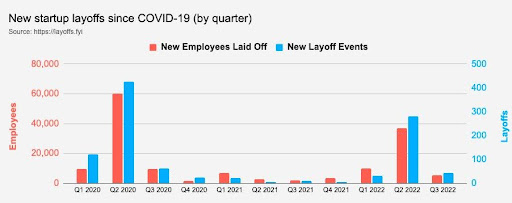The belief that the IT sector is going through a recession is becoming more common within the community. Some experts are describing a genuine crisis in the world of information technology.
This opinion is based on a few factors. First, finding a job in the IT field has become more challenging. In 2022, there was a high demand for IT professionals, but in 2023, this demand started to decrease. Many companies began cutting costs, including hiring fewer new employees.
Second, some IT companies face difficulties due to external factors. For example, the war in Ukraine and inflation negatively impacted the economies of many countries, leading to a reduced demand for IT products and services.
Third, some experts think that the IT industry has become overheated in recent years. The high demand for IT professionals led to higher salaries and increased qualification requirements. This factor, in turn, prompted some companies to reduce expenses by cutting costs.
Nevertheless, numerous experts concur that it is premature to declare a genuine crisis. So, who should we listen to?
In this discussion, we will thoroughly explore the topic of the IT market recession. We will investigate the underlying causes of the increasing concern and ponder whether it is advisable to invest in new projects at this time.
A quick reminder of what a recession is
To discuss the IT sector's recession knowledgeably, let's first understand what it means overall.
A recession in the economy is a slight but concerning downturn characterized by a drop in GDP, more people being unemployed, and businesses slowing down.
Several factors contribute to a recession:
- Inflation: In the USA, inflation reached 7.5% in September 2023, the highest in 40 years. High inflation means people might buy less, and more could lose their jobs. In Europe, there is unprecedented inflation, with rates reaching up to 10% in countries like Spain. The euro sharply declined against the dollar, reaching a parity last seen almost 20 years ago in September 2002.
- Higher interest rates: In 2023, the US Federal Reserve increased interest rates to control inflation. This approach could slow down economic growth.
- War in Ukraine: The conflict in Ukraine negatively affected the global economy, causing energy and raw material prices to rise.
Experts expect this recession to be short-lived, but it will impact most parts of the global economy. But what about the IT market?
Indicators of a recession in the IT sector
Why are people talking about a recession in the IT industry? When the value of cryptocurrencies began to plummet in the spring of 2022, it served as the first sign that something was going wrong in the global tech market.
A significant recent development has been the United States' deliberate efforts to address the financial crisis that followed the COVID-19 epidemic. During this period, many developed countries, not just the USA, started providing financial aid to citizens and businesses affected by the pandemic. This approach made access to funds more straightforward, leading to an increase in the overall money supply. This situation posed a threat to the value of traditional currencies, causing investors to panic. They started investing their money in alternative "stores of value," such as Bitcoin.

It's important to note that these government policies were justified during the pandemic's peak, as many people lost their jobs and needed support during that challenging time.
As a result, in 2023, IT specialists faced these issues:
1. Drop in IT product and service demand
Many IT companies are finding it hard to get new customers and are losing old ones. However, official data doesn't show an IT market crisis. Experts predict that global spending on IT in 2023 will be 5.5% higher than in 2022, reaching 4.6 trillion US dollars. So, why is there concern about reduced demand? There are a few reasons:
- IT specialists have a better sense of the market than statistics do. They see companies delaying or canceling new IT projects, cutting advertising and marketing costs, freezing hiring, or reducing salaries. These changes suggest reduced demand for IT products and services, even if the statistics don't confirm it.
- Some specialists compare the current situation to the 2019 IT boom caused by increased demand during the COVID-19 pandemic. This boom led to higher salaries and more requirements for qualifications. Many IT specialists benefitted from this period, gaining new opportunities and promotions. However, the global economy faces challenges now, leading to lower demand for IT products and services, reduced salaries, and job losses. Specialists who gained opportunities in 2019 might find it hard to keep these positions.
- IT specialists may overestimate the decrease in demand due to worries about how the recession might affect their industry.
Indeed, not all IT specialists are experiencing a drop in demand. Some IT areas, like cybersecurity and artificial intelligence, are still growing.
2. Reduction in IT investments
In the third quarter of 2023, global venture investors put $6 billion into financial technology companies. It is 36% less than the previous year, as reported by S&P Global Market Intelligence. The number of financing deals also decreased by 39%, totaling 484.
However, there's a positive trend: established startups, which faced significant challenges in previous quarters, are showing signs of recovery. They received 30% more funding and closed 30% more deals in the third quarter than last year.
One reason for the decrease in venture investments was discussions about the IT sector crisis. But here's some comforting news: it's unlikely that these investment cuts will escalate. The current situation mirrors the broader economic crisis, and in this context, the IT sector has been relatively less affected.
3. Layoffs in the IT sector
Many IT specialists are currently facing challenges in the job market. This situation has several causes:
- Reduced job opportunities: Many companies are cutting their workforce, leading to more people seeking jobs and increasing competition.
- Changing job preferences: IT companies are now primarily interested in artificial intelligence and cybersecurity experts. This shift makes it harder for professionals from other fields to find work.
- Overall decrease in demand: In general, there's been a drop in employee demand compared to the significant growth observed in 2019 during the pandemic.
- More individuals are trying to enter IT companies due to the allure of higher salaries and better working conditions, creating a perception of a crisis in the IT field.
High-profile layoffs at well-known companies intensify these worries. For example:
- Meta (formerly Facebook) laid off 13% of its workforce, about 10,000 people, in March 2023, stating the need to restructure and focus on key priorities.
- Netflix cut 150 jobs, approximately 2% of its workforce, citing a slowdown in revenue growth.
- Twitter reduced its team by 10% as part of cost-cutting measures.
- Tesla laid off 10% of its employees, aiming to eliminate redundancy.
- Coinbase let go of 18%let go of 18% of its workforce.
The statistics from Layoffs.fyi show that there has been a slight increase in layoffs since the beginning of the conflict in Ukraine. However, in May and June of 2022, the numbers saw a significant spike, with more than 16,000 people being laid off in each of these months.

According to data from Crunchbase News, as of mid-July, over 28,000 workers in the US technology sector had lost their jobs due to widespread layoffs in 2022. While this number is high, it hasn't yet reached the levels seen during the onset of COVID-19 in 2020, when, in certain months of quarantine, the number of layoffs reached 26,000.
In summary, while layoffs are causing concern, they are not as widespread or severe as they might seem from media reports. Understanding the history of the IT industry and the crises it has overcome can provide insights into its prospects.
Ups and downs in the IT market for the last 30 years
The IT industry has kept evolving and thriving since its inception. In the digital age, it's doubtful that the IT sector will lose its relevance.
A brief yet impactful history of the industry demonstrates that no crisis can halt IT development. One of the most significant crisis in IT was the bursting of the dot-com bubble.
The dot-com bubble was an economic bubble that occurred in the late 1990s in the stock market of internet companies. It peaked in March 2000, when the NASDAQ Composite index reached 5048.62 points. Afterward, the bubble started to deflate, and by early 2002, the NASDAQ Composite index plummeted to 1131.94 points.
Several factors contributed to the dot-com bubble, including:
- Internet proliferation: The Internet became more accessible in the late 1990s, increasing demand for Internet services and products.
- Investor euphoria: Investors were enthusiastic about the growth potential of internet companies and were willing to pay inflated prices for their stocks.
- Underestimation of risks: Many investors underestimated the risks of investing in Internet companies. They didn't consider that many companies were unprofitable and lacked real products or services.
The dot-com crisis had significant impacts on the US economy, such as:
- Collapse of many Internet companies: Numerous internet companies, highly valued during the bubble, proved to be unprofitable or unsustainable. They either went bankrupt or were acquired by other companies.
- Job losses: The dot-com bubble led to the loss of millions of jobs in the United States. Many internet companies had to downsize their workforce to cut expenses.
- Reduction in investment activity: The dot-com crisis also reduced investment activity in the US. Many investors became more cautious and stopped investing in risky assets.
The dot-com bubble is a clear example of how speculative activity can lead to economic disruptions. The global community learned a valuable lesson from this situation, and there haven't been such significant recessions in the IT industry since. However, it doesn't mean that the industry experienced only highs throughout the 2000s; global crises still have a considerable impact.
One of the most challenging and memorable global crises was the 2008 financial crisis. The economic downturn occurred in September, and understandably, it affected the IT industry. However, there were no massive layoffs; the crisis only impacted specialists' salaries. Junior employees were hit particularly hard, while more experienced staff even saw salary increases.
By 2010, the crisis had passed. The salary cuts that affected almost all employees turned into 50% growth. Most respondents in numerous surveys expressed optimism about their future.
Ups and downs are inevitable in any field. After substantial growth, the IT industry experiences a certain fallback as the pendulum swings the other way. The significant rise of the IT industry after the proliferation of personal computers ended with a slight decline due to the virus program crisis. The widespread use of mobile devices with internet access eventually led to restrictive data protection laws, which resulted in additional expenses.
We've mentioned the significant growth in the IT industry in 2019. Today, we are facing a recession caused by a macroeconomic crisis. This recession appears to be an incredible catastrophe, especially considering the widespread euphoria in the IT sector during the pandemic.
What will 2024 inherit from this year?
According to most experts, the IT industry is expected to recover in 2024. The recession that began in 2023 will gradually decline, and the demand for IT services will increase. Let's look at some trends that specialists believe will shape the IT industry in 2024:
- Transition to cloud technologies. Cloud technologies will keep advancing and entering new markets. Companies will rely more on cloud computing to cut costs and improve efficiency.
- Use of artificial intelligence. Artificial intelligence will be applied in a broader range of areas. Companies will use AI to automate tasks, enhance efficiency, and improve customer service.
- Blockchain technology. Blockchain will find applications in new sectors such as finance, healthcare, and logistics.
- Quantum computing. Quantum computing will progress, though it won't be extensively used in the commercial sector yet.
Despite the expected growth, companies will be more cautious with their investments, focusing on efficiency. Artificial intelligence also poses a significant challenge for many professionals. AI capabilities may lead to further job reductions.

However, IT industry professionals need not panic; the market will likely stabilize soon. The stabilization process has already begun.
What does the IT recession mean for businesses?
Indeed, the ongoing macroeconomic crisis has impacted numerous companies. However, if you've been contemplating an IT project, now is an opportune moment to proceed.
The IT industry recession leads to decreased prices for specialist services, enabling the implementation of IT projects with reduced costs. Additionally, due to the decreased demand for IT services, highly skilled professionals can handle various tasks. The lower demand encourages a more focused approach to each project. Consequently, the crisis facilitates faster project completion and heightened enthusiasm from IT companies.
At Vilmate, our experts can assist you with your project anytime. Our professionalism remains unwavering despite industry fluctuations; we consistently dedicate ourselves to our work. By reaching out to us today, you can stand out from competitors who have chosen to postpone technological advancements amidst the crisis.





